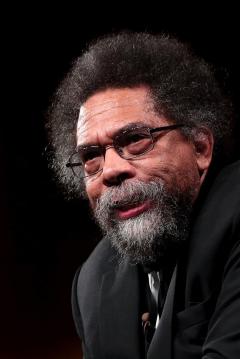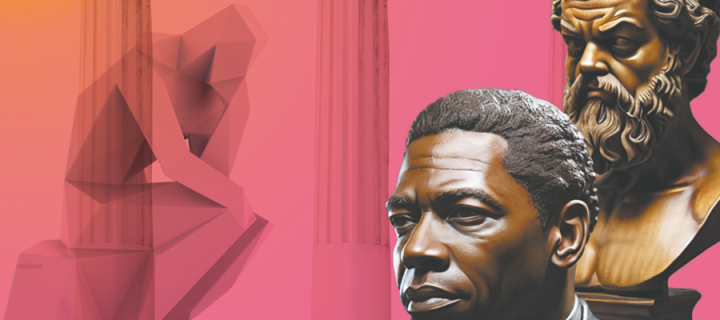2023/2024: Dr Cornel West - 'A Jazz-soaked Philosophy for our Catastrophic Times: From Socrates to Coltrane'

Dr Cornel West is the Dietrich Bonhoeffer Professor of Philosophy & Christian Practice, Union Theological Seminary, New York.
His teaching and publications focus on roles of race, gender, and class struggle in American society, synthesizing influences from Christianity, the black church, democratic socialism, left-wing populism, neopragmatism and transcendentalism.
A musician and spoken word artist, Dr West has collaborated with acts across the rap, hip-hop and funk genres, as well as appearing in the Matrix series and many documentary films.
These lectures reflect my passionate conviction that the vocation of philosophy may be, in the language of the great jazz musician, John Coltrane, a force for good in a broken world. My lectures will mobilize philosophic and artistic resources to help us make courageous, compassionate responses to our catastrophic times. My particular calling reflects my Christocentric and cruciform version of Christian life – a decolonizing and democratizing way of being wedded to the mysterious forces of kairos (disruptive hope), kinesis (holy folly of faith) and, above all, kenosis (revolutionary love). These forces – when embedded in great philosophic traditions – can sustain us in the painful but also joyful trek from womb to tomb.
Thank you
We would like to thank you for your interest in the series, whether you attended in person at the University of Edinburgh or watched virtually via our live stream. Summarised perfectly by Professor Stewart Jay Brown in our closing lecture, this series has been both memorable and incomparable - ‘an intellectual tour de force, incredibly rich in illustrations from history, philosophy, literature, poetry, theatre, and music, and inspiring us to go back to the sources, and try to think more deeply.’
Watch the series recordings on YouTube
For those who were unable to watch each lecture, you can now access the recordings via YouTube.
Watch the lecture series on YouTube: https://www.youtube.com/playlist?list=PLBcSHVMkBQZjGG8QbE5srld_4VHoeT_hs
Gifford Lecture Series blog
We would also encourage you to read and engage with the series blog to continue the conversation.
Read and engage with the Gifford Lecture Series blog: https://blogs.ed.ac.uk/gifford-lectures/
For any questions, please contact GiffordLectures@ed.ac.uk.
Lecture abstracts
Monday 6 May: Lecture 1 - Philosophic Prelude
How do we emerge from the bleakness of our catastrophic times? In seeking a way forward, I will proceed on three philosophic levels – the genealogical, existential and pedagogical. The genealogical, or historical, level of my analysis will set the stage, and my period will be broadly the Age of Europe (1492-1945) and Age of America (1945-2024). The existential level of my analysis will embrace the lived experiences of struggling, suffering creatures. The pedagogical level will be classical in character and musical in content. My overall theme will resonate with the three pillars of jazz – blues (tragicomic catastrophe lyrically expressed), swing (myopic time opened to new possibilities) and improvisation (practical wisdom and timely interventions unleashed).
Tuesday 7 May: Lecture 2 - Metaphilosophic Andante
We open with the inauguration of philosophy in the West. In his responses to Greek catastrophes, including the Peloponnesian wars, Plato provided profound resources for our own catastrophic moment. To be sure, Plato’s fear of disorder and unruly passions, and his denigration of history, blurred his lens, and could blind him to the catastrophic and tragicomic. And yet Plato also understood that ‘when, suddenly, like a blaze kindled by a leaping spark, it is generated in the soul and at once becomes self-sustaining’, philosophy could become redemptive and (in my conception) jazz-soaked and free-style.
Thursday 9 May: Lecture 3 - Folly Presto
My consideration of early modern philosophy focuses on Erasmus’s The Praise of Folly (1511) and Montaigne’s Essays (1580) – as responses to an era that saw devastating religious warfare, plagues, and famines, and the onset of European imperial conquests. The great public intellectual, Erasmus of Rotterdam, directed his classic work to the sheer absurdity, indeterminacy and frailty of human societies. Montaigne’s self-explorations, including his essays “Of Cannibals” (1580) and “Of Coaches” (1588), were among the first philosophic reflections on the barbaric European colonization of the New World. Erasmus and Montaigne were both path-blazing exemplars of blues, swing and improvisation in philosophy, facing dark folly with a free-style soul-craft.
Monday 13 May: Lecture 4 - History Adagio
The greatest breakthrough in modern philosophy is found in the works of the Italian Giambattista Vico. His perceptions wedded wisdom, eloquence, prudence and providence. The New Science (1725) was the first great philosophic European response to the New World. Vico saw Europe as locked into a dominant ‘barbarism of reflection’, yielding a rapacious individualism, and reducing philosophy to a paralyzing scepticism. In response, his conception of ingenium (ingenuity or improvisation) accentuated our creative human power to transcend barbarism
Tuesday 14 May: Lecture 5 - America Allegro Molto Vivace
The two great philosophically-inclined artists in early twentieth-century America were T.S. Eliot and Eugene O’Neill. Eliot’s work, especially his poems and criticism from 1917-1942, explored the end of the age of Europe with its wars, loveless creatures, hollow men, mindless barbarity, and devastated wastelands. Eugene O’Neill’s 49 plays constitute the greatest literary exploration of the cultural and spiritual dynamics of the American empire. Both Eliot and O’Neill understood the profound human tragedy of their times, but, trapped within a waning civilisation, neither artist could find a way out.
Thursday 16 May: Lecture 6 - A Love Supreme (A Way Through)
My jazz-soaked philosophy looks unflinchingly at our catastrophic times, and says that ‘perhaps’ we can find a way out. How do we go on loving, living, fighting, laughing, crying, swinging and singing? One answer lies in my tradition: the rich tradition of Black love in freedom and Black freedom in love. In literature, the two giants of this tradition are W. E. B. Du Bois and Toni Morrison. And in music, the Black tradition was honed in nearly three centuries of slavery and nearly another century of neo-slavery. This tradition kept a weary people in a God-forsaken world flowing with styles and smiles. Amid catastrophe, this Love Supreme transcends words, flows beneath sentences, and becomes flesh in deeds.


